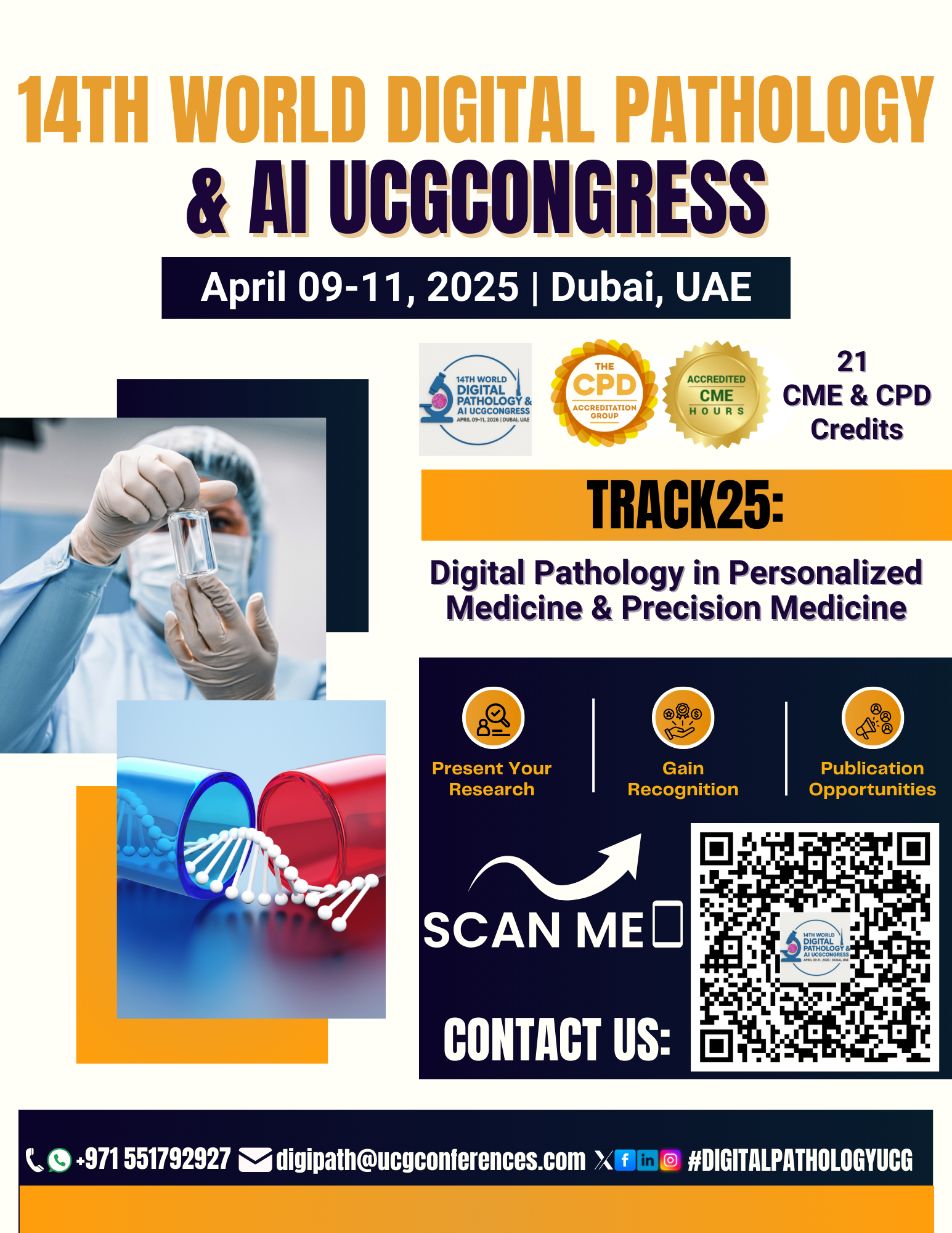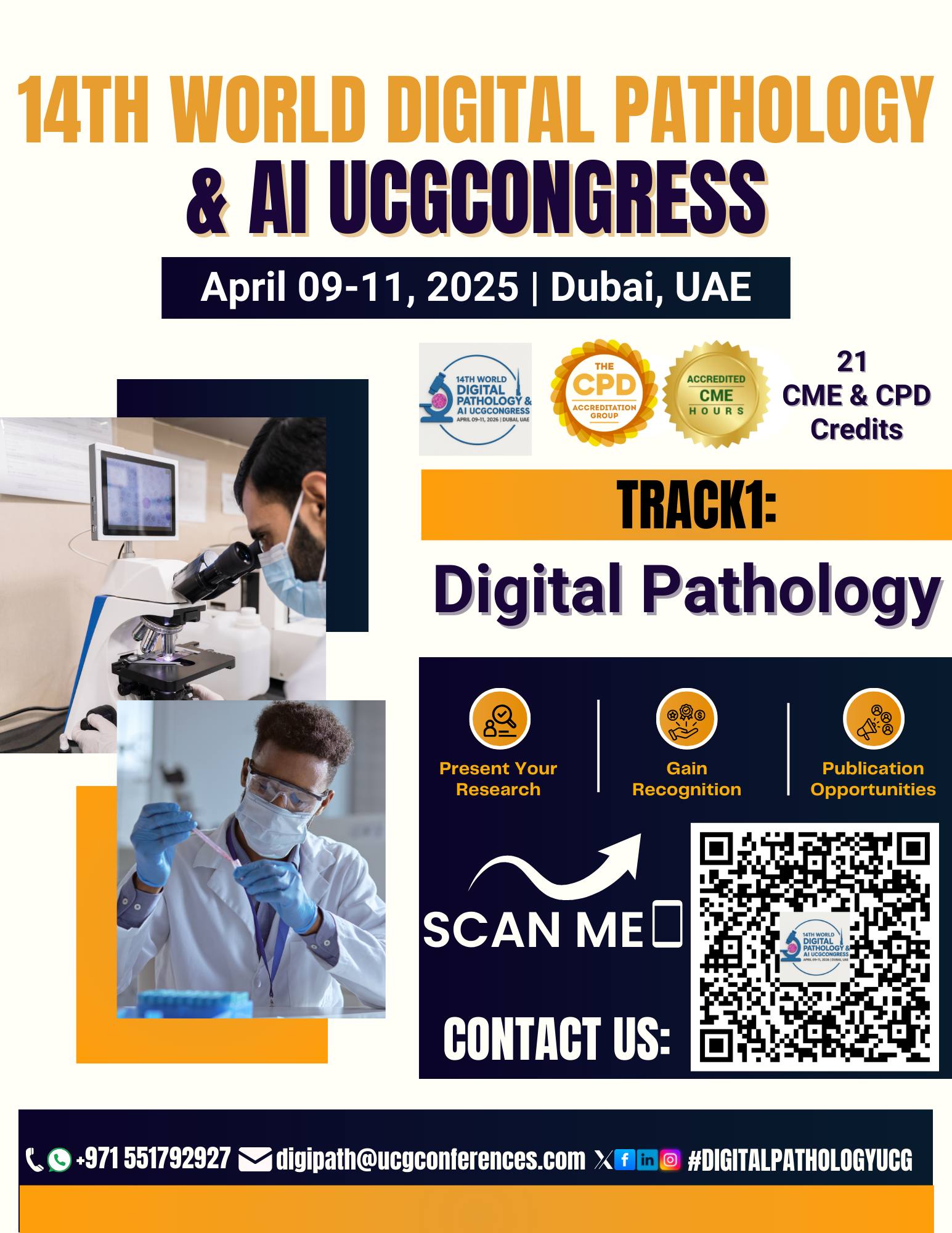



Sub track:-
Enhanced Image Quality Quantitative Analysis, Faster Turnaround Times,...

Sub track:-
Integration of Imaging Modalities, Advanced Image...

Track Overview:
Digital pathology is playing a transformative role
in personalized and precision medicine by enabling the identification of
disease biomarkers, informing treatment decisions, and allowing for more
tailored therapeutic approaches. This track will explore how digital pathology
technologies, including AI, whole slide imaging (WSI), and molecular profiling,
are revolutionizing the treatment of diseases such as cancer, cardiovascular
conditions, and genetic disorders. Attendees will learn how digital pathology
is enhancing diagnostic accuracy, guiding personalized treatment plans, and
improving patient outcomes.
Key Topics:
Introduction to Personalized and Precision Medicine:
Understanding the concepts of personalized and precision medicine and how
digital pathology fits into these approaches by tailoring treatments based on
individual patient characteristics.
Digital Pathology for Biomarker Discovery: How
digital pathology tools, including image analysis and WSI, are aiding in the
identification and validation of biomarkers that guide treatment decisions and
prognostic assessments.
AI and Machine Learning in Precision Medicine: The
role of AI in integrating digital pathology data with genomic, clinical, and
molecular information to provide more accurate diagnoses and treatment
recommendations.
Cancer Diagnosis and Treatment: The impact of
digital pathology in cancer diagnosis, from tumor classification and staging to
identifying targeted therapies based on molecular profiling.
Integration with Genomic and Molecular Data: How
digital pathology is used in combination with genomic sequencing and molecular
data to personalize treatment plans and monitor treatment responses.
Case Studies in Personalized Medicine: Real-world
examples of how digital pathology has been used in personalized medicine,
particularly in oncology, rare diseases, and genetic disorders.
Challenges and Future of Digital Pathology in
Personalized Medicine: Addressing the barriers to widespread adoption,
including regulatory challenges, data integration, and the need for
standardized workflows to ensure consistency and reliability in personalized
treatment.
Learning Objectives:
Gain an understanding of the role of digital
pathology in the advancement of personalized and precision medicine.
Learn how digital pathology tools are used for
biomarker discovery and to guide treatment strategies in a variety of diseases,
especially cancer.
Understand how AI and machine learning can be
applied to digital pathology for more precise diagnostics and treatment
planning.
Explore the integration of digital pathology with
genomic and molecular data to enable personalized medicine.
Gain insights into real-world applications and case
studies demonstrating the impact of digital pathology in personalized treatment
strategies.
Discuss the challenges faced in the implementation
of digital pathology for personalized medicine and the future opportunities in
this field.
Target Audience:
Pathologists, oncologists, and clinicians involved
in personalized and precision medicine.
Researchers working on biomarker discovery,
genomics, and molecular diagnostics.
Data scientists and AI professionals developing
machine learning algorithms for digital pathology and precision medicine.
Pharmaceutical and biotechnology professionals
working on targeted therapies and drug development.
Healthcare administrators and policymakers
interested in the implementation of digital pathology in clinical settings.
Speakers/Presenters:
Experts in personalized and precision medicine,
including clinicians and pathologists using digital pathology to inform
treatment plans.
AI and machine learning specialists applying
advanced algorithms to digital pathology images and molecular data.
Researchers involved in biomarker discovery and the
integration of digital pathology with genomic and clinical data.
Pharmaceutical professionals discussing the role of
digital pathology in drug development and personalized treatment strategies.
Regulatory experts focused on the standards and
guidelines for using digital pathology in personalized medicine.
Conclusion:
This track will provide an in-depth exploration of
how digital pathology is driving the future of personalized and precision
medicine. Attendees will learn how digital pathology tools are used to identify
biomarkers, guide targeted treatment, and improve patient outcomes, with a
focus on cancer and other diseases. The track will also address the challenges
in implementing these technologies and explore the potential for innovation in
personalized healthcare.